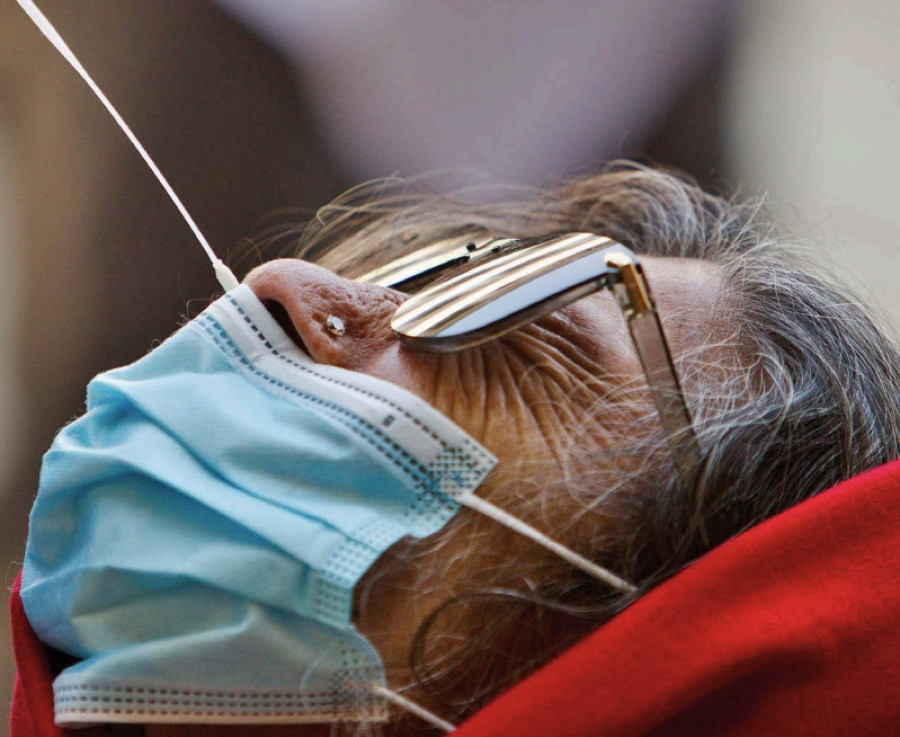Health
Experts say decision to form community Covid-19 monitoring groups too late too little
The decision doesn’t help contain the spread of the virus as government has not resumed contact tracing, they say.
Arjun Poudel
The Ministry of Health and Population said formation of community-level Covid-19 monitoring groups is in full swing throughout the country.
However, experts have questioned the utility of such groups as the government is not providing free testing and treatment to the public.
A group comprising local health workers, female community health volunteers, youths and representatives of civil society have been assigned to monitor 50 households.
“We hope that the community will take ownership in containing the spread of coronavirus with help from the monitoring group,” Dr Samir Kumar Adhikari, joint spokesperson at the Health Ministry, told the Post. “The groups will increase the engagement of the people in the community, and this will help in contact tracing, case management, and monitoring of the infected people.”
The ministry on November 2 had decided to form the monitoring groups and resume free testing and contact tracing. However, with the exception of the formation of monitoring groups in some places, the government hasn’t implemented the decision due to changes in its testing guideline.
Although the ministry had decided to resume contact tracing and free testing, its guideline said that only ‘symptomatic’ patients will be provided free testing. This inhibited the resumption of contact tracing.
Officials said that high-level teams led by senior officials from the ministry have been deployed in all seven provinces across the country to coordinate and speed up the formation of community-level monitoring groups.
Public health experts, however, are sceptical about the effectiveness of such community-level monitoring groups.
“It is too little, too late,” Dr GD Thakur, former director at the Epidemiology and Disease Control Division, told the Post. “Such groups are necessary but should have formed when the government decided to allow the infected to isolate themselves at home.”
Due to lack of monitoring of the infected, who were allowed to remain at home, they roamed freely in the community and this helped spread coronavirus, officials have assessed.
The ministry had urged the public to inform the administration if they saw infected people move freely in society, and had also warned of legal action against such people.
Thakur said the objective of containing the spread of coronavirus will not be met by only asking people of the community to monitor the movement of the infected. “How would the monitoring group know who is infected and who is not if we do not restart the contact tracing ?” Thakur asked. “Monitoring of the infected people is only part of the containment measure, it can’t be the magic wand to solve all problems.”
With the government halting free tests and contact tracing, the number of tests carried out across the country each day has declined. Experts warn that negligence on the part of the authorities concerned in containing the spread of the infection will be costly for the country and people.
Meanwhile, intensive care unit and ventilator occupancy rates increased and death rates have risen following the halt in free testing and contact tracing. Doctors complained that people are waiting at home until they become critically ill or fall unconscious.
As of Thursday, 237,589 people have tested positive for the disease throughout the country, with 1,551 deaths. In the last 24 hours, 1,343 people tested positive, including 561 in Kathmandu Valley. The ministry said that 220,272 people have recovered from the disease so far.
“If the government doesn't conduct testing and resume contact tracing, how can it ask people to stay inside all the time?” Dr Sushin Nath Pyakurel, former acting secretary at the Health Ministry, told the Post. “And how would people know whether they are infected or not without getting tested?”
As intensive care units and ventilators are fully occupied in all hospitals designated for treatment of coronavirus, the community monitoring groups can’t do anything even when they know that the health condition of an infected patient is deteriorating fast.
Pyakurel said that if they can’t arrange beds or provide help to the infected family, monitoring groups will be unable to force them to stay at home. “Apathy towards the implementation of decisions is the main problem. This has taken the country to this stage,” Pyakurel added. “Coordinated efforts are needed if we are to contain the spread of infections. Authorities should show seriousness towards containing the spread of the virus and saving lives.”




 14.24°C Kathmandu
14.24°C Kathmandu















